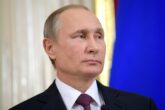February 21, 2024
For Heaven’s Sake: Why Would Russia Want To Nuke Space?
It can be more than a little scary to look into the mind of a dangerous dictator like Vladimir Putin. But as Russia has several thousand nuclear weapons, managing stability and avoiding nuclear war requires that America try to understand what is happening with both the mind of the country’s leader and capabilities of its military. Deterrence is about understanding how our actions influence that of others, and vice versa. Thus, it remains essential to consider what Russia (and other adversaries) is pursuing in terms of possible contingencies, and interpret changes in military and strategic capabilities.
Legally and morally, the U.S. and its allies should call out any such illegal and dangerous effort for what it is – madness.
So when news broke in February that Russia was reportedly building some nuclear connected anti-satellite weapon, a lot of people started scratching their heads. First, because of the manner in which the news was leaked. Congressman Mike Turner seemed to get ahead of both the process and the intelligence itself, and created a bit of a panic by demanding full and immediate declassification of all information about the system. It now seems this was alarmist, and perhaps motivated by other political factors. Leaks seemed to indicate that Russia might be planning to launch a nuclear-powered anti-satellite directed energy weapon into space. U.S. officials are reportedly telling allies Russia could launch the system into space within the next year. Details became a little clearer, thanks to a public briefing by White House Advisor Adm. John Kirby. Kirby confirmed that the planned system was still in development, and President Biden later said it was not clear if and when the system would be deployed. Importantly, Kirby also stated that the system, if deployed, would violate the Outer Space Treaty of 1967. That phrase made clear that the Russian program involved placing a nuclear weapon in outer space, since deploying nuclear weapons in space is the main and only specific constraint contained in the OST.
Read the full article from the Federation of American Scientists.
More from CNAS
-
The Eurasian Century: Hot Wars, Cold Wars, and the Making of the Modern World with Hal Brands
For more than 100 years, the continent of Eurasia has played a central role in global geopolitics. In the 20th century, numerous authoritarian powers from Germany under Kaiser...
By Andrea Kendall-Taylor, Jim Townsend & Hal Brands
-
Putin’s Fight Won’t End With Ukraine
In an essay for Foreign Affairs, titled “Putin’s Point of No Return,” Andrea Kendall-Taylor, senior fellow and director of the Transatlantic Security Program at the Center for...
By Andrea Kendall-Taylor
-
Trump’s Callout of Russia’s Vladimir Putin Is Raising Eyebrows
President Trump is threatening sanctions and tariffs on Russia if Putin doesn't reach an agreement to end the war in Ukraine. Some are surprised, considering Trump's affinity ...
By Andrea Kendall-Taylor
-
In Russia's Perceived War with the West, Arms Control is Collateral Damage
Russia seemingly perceives previously established arms control agreements as elements of the broader Western-dominated political and security order that it aims to overturn....
By Nicholas Lokker




